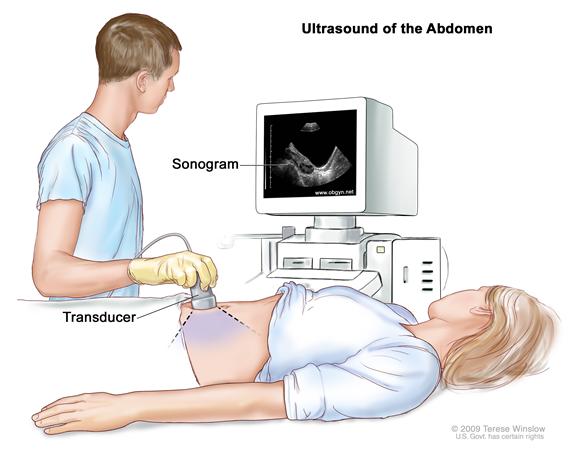What is Ultrasound?
Ultrasound, also known as sonography, is a non-invasive diagnostic imaging technique that uses high-frequency sound waves to create images of internal organs, tissues, and blood flow. It helps healthcare providers detect and diagnose medical conditions without the need for radiation or invasive procedures.
How Does Ultrasound Work?
- A transducer (probe) emits sound waves into the body.
- These waves bounce off internal structures and return to the transducer.
- The ultrasound machine processes these echoes to create detailed images in real time.
Ultrasound is widely used for its safety, accuracy, and ability to provide immediate results.
Uses of Ultrasound
Ultrasound is used to examine a variety of organs and conditions. Common uses include:
- Pregnancy: Monitoring the health of the fetus and detecting any potential issues.
- Abdominal organs: Assessing the liver, gallbladder, kidneys, spleen, and pancreas.
- Heart: Echocardiograms to evaluate heart function, structure, and blood flow.
- Musculoskeletal: Visualizing muscles, tendons, and joints.
- Blood flow: Doppler ultrasound to evaluate blood flow and detect blockages in veins and arteries.
- Thyroid: Checking for thyroid nodules or other thyroid-related issues.
- Pelvic organs: Examining the uterus, ovaries, and bladder for conditions like fibroids or cysts.
Types of Ultrasound
- Abdominal Ultrasound:
Used to examine organs like the liver, gallbladder, pancreas, kidneys, and spleen. It helps diagnose conditions like gallstones, liver diseases, and kidney disorders.
- Pelvic Ultrasound:
Commonly used for reproductive health, this type of ultrasound evaluates the uterus, ovaries, and bladder. It is also used to monitor pregnancy and diagnose conditions like ovarian cysts or fibroids.
- Obstetric Ultrasound:
Specialized for pregnancy, this ultrasound monitors fetal growth, development, and overall health.
- Cardiac Ultrasound (Echocardiography):
Evaluates the heart's structure and function, detecting abnormalities like heart valve issues or congenital defects.
- Vascular Ultrasound:
Focuses on blood vessels to detect blockages, blood clots, or poor circulation.
- Musculoskeletal Ultrasound:
Examines muscles, ligaments, and tendons to diagnose injuries or conditions like sprains and tears.
- Breast Ultrasound:
Provides additional imaging for detecting lumps or abnormalities in breast tissue, often used alongside mammography.
- Thyroid Ultrasound:
Evaluates the thyroid gland for conditions like nodules, enlargement, or cysts.
- Transvaginal and Transrectal Ultrasound:
- Transvaginal: Provides detailed imaging of the female reproductive organs.
- Transrectal: Used for prostate imaging in men.
- Doppler Ultrasound:
Measures blood flow and detects issues like clots or narrowed blood vessels, aiding in vascular diagnosis.
Symptoms Requiring an Ultrasound
An ultrasound may be recommended if you experience the following symptoms:
- Persistent pain or swelling in the abdomen, pelvis, or joints
- Unexplained weight loss or gain
- Abnormal blood flow or varicose veins
- Difficulty swallowing or shortness of breath
- Abnormalities found during a routine physical exam
- Pregnancy-related issues or to check fetal development
- Urinary problems or suspected kidney stones
- Abnormal growths or masses in organs
Procedure
- Preparation:
Depending on the area to be examined, you may be asked to drink water, fast for a few hours, or change into a hospital gown. - Gel Application:
A special gel is applied to the skin to help the transducer make good contact with the skin and allow sound waves to pass through more effectively. - Imaging:
The technician or doctor moves the transducer across the targeted area. The transducer emits sound waves, which bounce back to create images on a monitor. - Duration:
The procedure typically takes 15 to 45 minutes, depending on the area being examined. - Post-Procedure:
After the scan, the gel is wiped off, and you can resume normal activities. In most cases, the results are available within a few hours or the next day.
Advanced Techniques in Ultrasound
Some advanced ultrasound techniques include:
- 3D/4D Ultrasound:
This provides a three-dimensional view of the fetus during pregnancy, giving more detailed images of the baby. - Doppler Ultrasound:
Uses high-frequency sound waves to evaluate blood flow through vessels and arteries. This is crucial for detecting blood clots, plaque, or blockages. - Elastography:
Measures the stiffness of tissue, often used to assess liver health or detect tumors. - Contrast-Enhanced Ultrasound (CEUS):
Uses a contrast agent to improve the clarity of ultrasound images, often used in cardiac imaging and for evaluating tumors.
Why Choose India for Ultrasound Imaging?
India has become a leading destination for diagnostic services, including ultrasound imaging, due to the following reasons:
- Cost-Effective:
Ultrasound procedures in India are significantly more affordable compared to countries like the US, UK, or Canada. - World-Class Facilities:
India has numerous hospitals and diagnostic centers equipped with advanced ultrasound machines and cutting-edge technology. - Skilled Technicians:
India has a vast pool of experienced radiologists and sonographers who are skilled in handling a variety of ultrasound procedures. - Comprehensive Care:
Ultrasound services in India are provided as part of a holistic health care system, ensuring comprehensive diagnosis and treatment.
Why Choose Healtour Solutions?
Healtour Solutions ensures that you receive the best ultrasound imaging services through our partnerships with top hospitals and diagnostic centers in India. We connect you with the right professionals and guide you through the process.
Key Benefits of Choosing Healtour Solutions:
- Expert Care: Access to top radiologists and sonographers for accurate results.
- Affordable Packages: Competitive pricing without compromising quality.
- Personalized Service: Tailored solutions based on your individual health concerns.
- Convenience: End-to-end assistance, from booking your appointment to post-procedure care.
Cost of Ultrasound in India
The cost of ultrasound in India varies based on the type of scan and location. Typical prices are:
- Basic Ultrasound: INR 1,500 to INR 5,000 (approximately USD 18 to USD 60).
- Doppler Ultrasound: INR 4,000 to INR 8,000 (approximately USD 50 to USD 100).
- 3D/4D Ultrasound: INR 10,000 to INR 20,000 (approximately USD 120 to USD 240).
Factors influencing the cost include:
- Type of ultrasound scan
- Location and reputation of the medical facility
- Availability of advanced technologies (like Doppler or 3D/4D)
Benefits of Ultrasound
- Non-invasive: No surgery or incisions required.
- Real-time Results: Immediate imaging results to guide further treatment.
- Safe: No exposure to harmful radiation, making it safe for pregnant women and children.
- Versatile: Can be used to assess many different areas of the body, including the heart, abdomen, and pelvic organs.
- Affordable: Compared to other imaging techniques like CT scans or MRIs, ultrasound is highly affordable.
Post-Procedure Care
- No Recovery Time: Ultrasound is a non-invasive procedure, so there is no recovery time required.
- Stay Hydrated: If your ultrasound involved a full bladder, make sure to drink water to replenish fluids.
- Follow-Up: Your doctor may suggest follow-up imaging or tests based on your ultrasound results.
- Monitor Symptoms: If you experience any unusual symptoms after the scan, contact your healthcare provider immediately.
FAQs
- What does an ultrasound show?
An ultrasound shows images of soft tissues, organs, blood vessels, and the fetus during pregnancy.
- Is ultrasound painful?
No, ultrasound is generally painless. You may feel slight discomfort from the pressure of the transducer on the skin.
- How long does an ultrasound take?
Most ultrasound exams take between 15 and 45 minutes.
- Can ultrasound detect cancer?
Ultrasound can detect abnormal growths, but further tests like biopsy may be required for cancer diagnosis.
- Can I eat or drink before an ultrasound?
It depends on the type of ultrasound. For abdominal ultrasounds, fasting may be required, while others like pelvic ultrasounds may need a full bladder.
- Are ultrasound results immediate?
In most cases, the results are available immediately or within a few hours.
- Is ultrasound safe during pregnancy?
Yes, ultrasound is safe during pregnancy and is commonly used to monitor fetal development.
- What’s the difference between an ultrasound and a CT scan?
Ultrasound uses sound waves and is non-invasive, while CT scans use X-rays and may involve radiation.
- Can I drive after an ultrasound?
Yes, there are no restrictions after an ultrasound, and you can resume normal activities immediately.
- How do I book an ultrasound appointment?
You can contact Healtour Solutions for assistance in booking an ultrasound appointment with top diagnostic centers.



